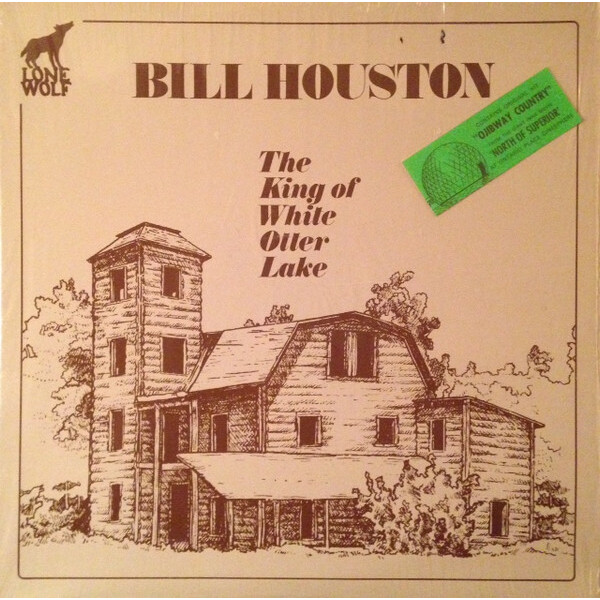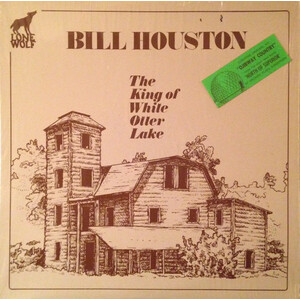Information/Write-up
Bill Houston is a Canadian singer-songwriter whose work is deeply tied to the landscapes and legends of Northern Ontario. Born in Whitehorse, Yukon in 1943 to a fur trader from Belfast and a schoolteacher from Killaloe, Ontario, Houston spent his earliest years in remote northern communities such as Attiwapiskat and Lac Seul before his family eventually settled in Sioux Lookout. The long northern winters, isolation, and connection to the land left a deep impression, and even decades later his songs carried a sense of solitude and place.
In 1963, at the age of nineteen, Houston set out hitchhiking through Europe and the Middle East. Short on money in Spain, he spent his last $20 on a guitar, teaching himself to play while busking in the cafés of Rome and later writing songs on a kibbutz in Israel. Returning to Northwestern Ontario, he worked for his father’s newspaper and on the railroad while continuing to write and perform. His first film credit came in 1970 with “Northern Journey,” used in The Superior Scrapbook, an NFB production that brought him to the attention of filmmaker Graeme Ferguson.
The following year Ferguson commissioned Houston to write a song for what would become the very first IMAX film, North of Superior (1971). Houston not only composed and performed “Ojibway Country” but also suggested the title itself—originally “North of Lake Superior,” later shortened by Ferguson. Recorded at Eastern Sound in Toronto with producer Zal Yanovsky of the Lovin’ Spoonful and musicians Maribeth Solomon, Mickey Erbe, Brian Leonard, and Lenny Solomon, the song debuted at Ontario Place’s Cinesphere at the grand opening in May 1971. For many Canadians, the soaring aerial images of Lake Superior were indelibly linked to Houston’s voice, and audiences left the theatre humming “Ojibway Country.” The film became the most widely seen IMAX feature of its era, making Houston’s song a touchstone for a generation.
In 1975 he established his own label, Lone Wolf Productions, and released The King of White Otter Lake, an album centered on the true story of Jimmy McQuat, the eccentric builder of the hand-hewn White Otter Castle near Atikokan. The song became Houston’s most published and reproduced work, cementing his place as a chronicler of northern lore.
Houston followed with North of Superior (1997), a CD that reflected his deep connection to the region and featured a newly recorded version of “Ojibway Country” alongside other spiritually rooted songs from Northern Ontario. Produced by George Gregorovich and Sean Mundy in Thunder Bay, the album was dedicated to his parents and children. In 2006, The King of White Otter Lake was reissued as a digitally remastered CD; this edition included a studio adaptation of “Ojibway Country,” produced by Al Allbutt and Roy Smith, drawing on Zal Yanovsky’s original arrangement and featuring Bobby Edwards on electric guitar. Two years later he released Bring Back the Music (2008), a streaming-only collection that reaffirmed his independence as a songwriter working outside the mainstream industry.
Throughout his career, Houston’s music has remained independent, heartfelt, and proudly local. His songwriting spans folk, country, and pop, but always circles back to the stories and spirit of the North—Thunder Bay, Lake Superior, the wilderness of Northwestern Ontario. Whether celebrated in the legend of White Otter Castle, carried to millions in an IMAX theatre, or rediscovered through reissues, his songs endure as cultural touchstones of Canada’s North.
-Robert Williston
Bill Houston: twelve-string guitar, harmonica, lead vocals, backing vocals
Jeweli Rowlandson: backing vocals
Joy Hisey: backing vocals
Shelby Gregory: backing vocals, producer (tracks 1–4, 6–10)
The Red Army Extra Gang: backing vocals
Grit Laskin: banjo, folk guitar, mandolin (tracks 2, 8, 10)
Gregory Alliston: classical guitar (tracks 3, 6, 9)
Michal Hasek: dobro (“Ojibway Country”)
Roly Greenway: electric bass (tracks 1, 3, 4, 6–8, 10)
Mickey Erbe: electric bass, cornet (“Ojibway Country”)
Bobby Edwards: electric guitar (“Ojibway Country”)
Maribeth Solomon: harpsichord, flute (“Ojibway Country”)
Brian Leonard: percussion (“Ojibway Country”)
Zal Yanovsky: original musical arrangement for “Ojibway Country”
All songs written and composed by Bill Houston (except cuts 6 & 7 published by Leeds Music of Canada)
Produced by Shelby M. Gregory (tracks 1–4, 6–10)
Incidental adaptation for “Ojibway Country” by Al Allbutt and Roy Smith
Engineered by Tom “The Music Freak” Brennand
Recorded and mixed at Eastern Sound, Toronto, Ontario
Recorded and mixed at Creative Electronics Sound Studio, London, Ontario
Remastered by Rob Jardine and Paul Mills
Artwork and design by Carlene Brady (castle sketch and Lonewolf logo)
Photography by Mel Henderson
The song “Ojibway Country” ©1971 by the Government of Ontario, Toronto, Canada & Bill Houston
Acknowledgements
Musical friends: Al Allbutt, Loreto Doyle, Bill Fetter, Tom Lodge, Wayne Smith, and all the crew at Fanshawe College, London, Ontario
Michal Hasek’s performance courtesy of NAJA Records
Heartfelt thanks to: Brian Avery, Baily Bird, Howard Cable, Warren Collins, Mr. & Mrs. W.H. Houston, Graeme Ferguson, David Greenwood, Orville Hoover, Tom Kelly, Victor Jonsson, Bill Lemmon, David MacFadden, Toni Trow, Phyllis Wilson, and many others
Special thanks: The CAPAC-CAB committee 1973–74
Dedicated in deepest gratitude to Abram Hoffer
Lone Wolf Productions
530 McTavish St., Thunder Bay, ON, Canada, P7C 3C3
"The King of White Otter Lake" is Bill Houston's first album. The title track from this album tells the tale of Jimmy McOuat, a persistent and ingenious man who built a castle on White Otter Lake near Ignace, ON. Jimmy became a legend and the song became Houston's most published and reproduced work.
The King of White Otter Lake
All up and down this land he travelled, lookin' for a home
He was all of thirty-five, when he set out alone
His soul was burning with a fire, a curse was on his name
He was the king of White Otter Lake
"Build me a castle" she said
"Make it three times over my head
Glass in the windows, paint on the doors
Then my darlin', I will be yours"
For many years as seasons changed, he struggled with his task
No one knows how this was done, no one stopped to ask
Higher, ever higher still, as it began to rise
By the shore of White Otter Lake
CHORUS
Then one day a message came, with words so clear and strong,
A letter from his loved one read, "I've waited far too long
You can have your castle fine, I never shall belong
To the king of White Otter Lake"
Now the castle stands in tribute, but it stands alone
The picket fence has fallen down, the weeds around have grown
But the man whose heart and hands became a legend to us all
Is still the king of White Otter Lake...
He's the king of White Otter Lake
CHORUS


No Comments